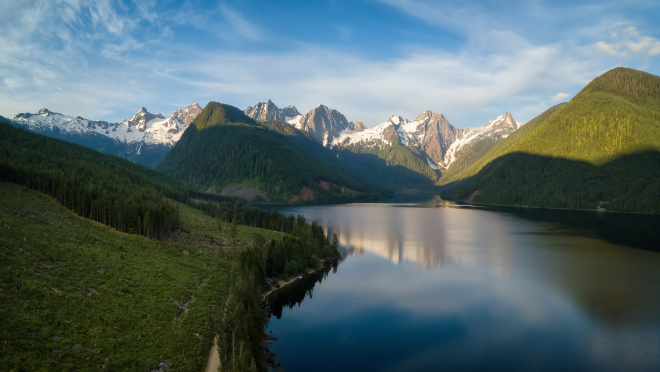Tap into savings: try these ways to reduce water use

10 water saving tips: making every drop count
As we head into the hot summer months, you can do your part to help save water. Here are some of our best water-saving tips.
Stop handwashing dishes
According to a German study, a full dishwasher load can wash 144 items with 13 litres of water, while hand washing those same items uses 100 litres on average. So if you have a dishwasher, use it, and select the eco mode, even if it takes longer. Resist rinsing your dishes before putting them in the dishwasher. Just scrape food scraps off dishes (a silicon spatula works best) before putting them in the dishwasher, and arrange your dishes so that few, if any, touch. That will ensure the washer's jets properly clean all your dishes.
Buying a new dishwasher? Browse for energy-efficient options at our online Power Smart Shop.
Let that lawn go brown, or rewild your yard
A brown lawn is not a dead lawn, so consider letting your lawn go. A 2005 NASA-led study found that in most U.S. regions, up to 75% of a home's total water usage is for lawn irrigation.
If you want to learn which grasses fare better in drought than others, check out this Better Homes & Gardens story about brown lawns. And closer to home, see the before and after photos a B.C. resident posted in a 2022 letter to the editor in the Aldergrove Star about how quickly his browning lawn bounced back.
Looking to the long term, consider turning your lawn into a meadow full of drought-resistant native plants. A cbc.ca story from last May looked at the increase in "meadow-making" in Vancouver Island's Capital Region District.
Water plants strategically, early in the morning
Water gardens slowly, in the morning, by hand, near the roots. Break up hardened dirt to allow water to soak in, and consider adding mulch to your gardens, as it shades soil and helps conserve soil moisture.
Metro Vancouver's Grow Green Guide is a fantastic online resource for designing gardens and lawns in the Lower Mainland. Use the website's Pick A Plant search tool, to filter by plant type, sun exposure, plant height, and bloom colour.
Install low-flow showerheads and faucet aerators
Low-flow, energy-efficient showerheads will help cut down on the amount of water you use, without sacrificing water pressure or your shower time. You can get a low-flow showerhead for as little as $15 or less, and the energy savings in hot water will pay that off fairly quickly.
To start with, check to see that a manufacturer's eco promise rings true. Unless the showerhead uses less water than the typical 2.5 gallons per minute (gpm) – ideally 1.75 gpm or less – it's not really delivering. Take the time to check the gpm number and recognize that not all websites deliver that data. You may have to input that model number into a website that does.
Water-saving faucet aerators help you cut down on water use, which will cut down on your electricity costs. Installing a high-efficiency aerator on your kitchen sink could save you $28 per year in hot water costs.
Get a rain barrel
Consider adding a rain barrel to your yard to grab the freely available rain for when you need it. Several B.C. municipalities offer rebates each spring for the purchase of rain barrels but act fast on those offers – they're increasingly popular. You can get rain barrels, starting at about $120, at larger home and garden shops in B.C.
Flush your toilet less
According to the City of Vancouver, the biggest water use in your home is from flushing your toilet, at an average of 24%, followed by showers at 20%. Try to avoid flushing when you don't have to – and consider employing the cottage life mantra: 'If it's yellow, let it mellow'.
Take shorter showers
Take three minutes off your shower times and the savings, both in water use and in energy savings, will add up. If two people in your household do it for a year, you could save $90 in electricity costs.
Take care, meanwhile, to turn the water off while shaving, soaping up your hands, or brushing your teeth.
Inspect your taps, fix leaks
Do an inspection of your taps a couple times a year, and learn how to fix leaks. Even a slow-dripping leak can cost you $9 a year in hot water heating costs.
Replace that top-loading washing machine
When shopping for a new clothes washer, look for ENERGY STAR®-certified models. These have been tested to meet the highest standards for energy efficiency and reliability. They use about 25% less energy and 33% less water than regular washers.
Plus, an ENERGY STAR front-loading machine can cut water use by nearly 40% and electricity use up to 65% compared to a conventional top-loader.
Be pet smart
Our furry friends need to water to stay hydrated and comfortable. Using a water fountain with a filter can be a great way to keep the water clean for longer by filtering out loose hair, food and dust from the bowl. Then, repurpose the old water on plants and grass instead of tossing it down the drain. Don’t forget to turn off the tap while giving your pets a bath and use solid pet shampoos instead of liquid ones. They last longer, and use a lot less water.
Related:
- Water-saving tips (BC Hydro)
- World Water Day 2024 (United Nations)
- World Water Day resources (United Nations)